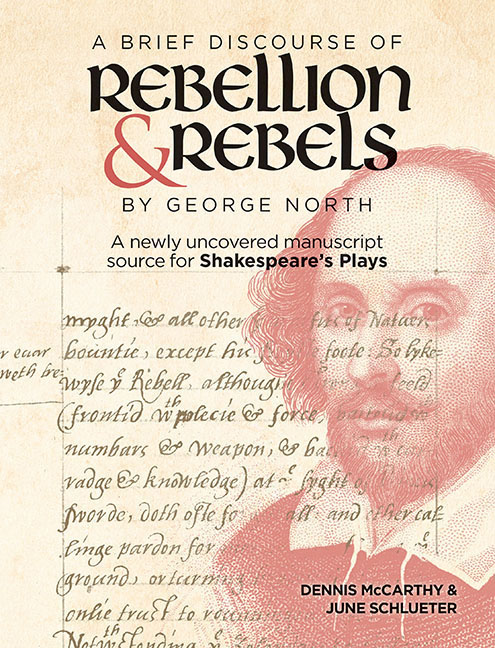 'A Brief Discourse of Rebellion and Rebels' by George North
'A Brief Discourse of Rebellion and Rebels' by George North Book contents
- Frontmatter
- Contents
- Acknowledgments
- 1 George North and the Kirtling Hall Manuscript
- 2 Uncovering Connections Between North's “Discourse” and Shakespeare's Plays
- 3 The Final Hours of Jack Cade
- 4 The Fool, Merlin's Prophecy, and the Upside-Down World of King Lear
- 5 Political Monologues and a Glimpse of Coriolanus
- Afterword: The Odds That the Parallels Are Coincidental
- The Transcript: “A Brief Discourse of Rebellion and Rebels,”, by George North
- Facsimile: “A brief discourse of rebellion and Rebells, wher'in isshowyd, ye treasur yt Traytors in yye execution of theyr treason, by tym attayne to,” by George North
- Index
4 - The Fool, Merlin's Prophecy, and the Upside-Down World of King Lear
Published online by Cambridge University Press: 09 October 2019
- Frontmatter
- Contents
- Acknowledgments
- 1 George North and the Kirtling Hall Manuscript
- 2 Uncovering Connections Between North's “Discourse” and Shakespeare's Plays
- 3 The Final Hours of Jack Cade
- 4 The Fool, Merlin's Prophecy, and the Upside-Down World of King Lear
- 5 Political Monologues and a Glimpse of Coriolanus
- Afterword: The Odds That the Parallels Are Coincidental
- The Transcript: “A Brief Discourse of Rebellion and Rebels,”, by George North
- Facsimile: “A brief discourse of rebellion and Rebells, wher'in isshowyd, ye treasur yt Traytors in yye execution of theyr treason, by tym attayne to,” by George North
- Index
Summary
A comparison of King Lear and George North's “Discourse,” especially fols 35v–37, once again suggests a relationship between North's writing and Shakespeare's. Indeed, North's conflating of a prophecy by Merlin with a description of role-reversals in a topsy-turvy world offers a primary example of King Lear's debt to the earlier text. “Discourse” may even have provided the basis for the character of the Fool, who quotes Merlin explicitly, emphasizing the sixth-century Prophet with whom he has much in common. Or, to be more precise, Lear's Fool resembles the peculiar version of Merlin described in “Discourse.” Moreover, North's poems on the hunted and famished rebels, Glendower and Cade, figured in the crafting of the hunted and famished Poor Tom. Many of Jack Cade's lines in “Discourse” also appear in King Lear, and they are frequently associated with Poor Tom.
The following excerpt is just one example of the myriad descriptions in King Lear of a world turned upside-down:
Lear: … yet you see how this world goes.
Gloucester: I see it feelingly.
Lear: What, art mad? A man may see how this world goes with no eyes. Look
with thine ears. See how yond justice rails upon yond simple thief. Hark in thine
ear: change places and, handy-dandy, which is the justice, which is the thief?
Thou hast seen a farmer's dog bark at a beggar?
Gloucester: Ay, sir.
Lear: And the creature run from the cur? There thou mightst behold the great
image of authority: a dog's obeyed in office. (4.6.147–59)
With Lear's imagining of a thief playing a justice and a dog commanding a beggar, we see allusions to Jack Cade and Edgar/Poor Tom. In the English history play, Cade, the commoner rebel and thief, switches places with Lord Say, a fair and noble justice: Cade, the play's force for chaos, sits in judgment of Say, and his verdict is beheading. Similarly, in King Lear, when the desperate, pursued, and starving Edgar disguises himself as Poor Tom, he witnesses Lear's mad trial, playing the role of a “learnèd justicer” (3.6.21), though, of course, Edgar's noble impulses remain. William C. Carroll is one of many scholars who have emphasized the resemblances between Cade and Poor Tom, including in this scene:
Cade's attempted ascent to a kind of peasant kingship, Poor Tom's elevation to the position of “learned justice” …
- Type
- Chapter
- Information
- 'A Brief Discourse of Rebellion and Rebels' by George NorthA Newly Uncovered Manuscript Source For Shakespeare's Plays, pp. 52 - 77Publisher: Boydell & BrewerPrint publication year: 2018


